
Latest research and knowledge exchange news at Bournemouth University

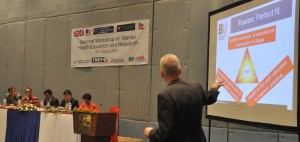 We have written in many previous BU blogs about progress of our THET-funded project in southern Nepal (e.g. here AND here ). Today’s blog reflects on the use on BU’s unique FUSION approach in our project ‘Mental Health Training for Maternity Care Providers in Nepal‘.
We have written in many previous BU blogs about progress of our THET-funded project in southern Nepal (e.g. here AND here ). Today’s blog reflects on the use on BU’s unique FUSION approach in our project ‘Mental Health Training for Maternity Care Providers in Nepal‘.
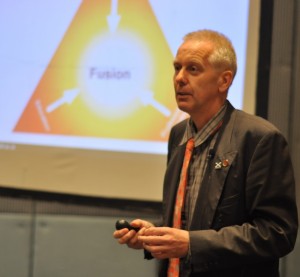 Our BU-led project brings highly experienced health professionals, such as midwives, health visitors or mental health nurses, to Nepal to work as volunteer trainers. The training is aimed at community-based maternity care practitioners and addresses key mental health issues relevant to pregnancy and for new mothers and offers the required communication skills. These health professionals will bring their experience as health care providers as well as trainers in the field of mental health and maternity care/midwifery, mental ill-health prevention and health promotion. They volunteer for two to three weeks at a time to design and deliver training in southern Nepal.
Our BU-led project brings highly experienced health professionals, such as midwives, health visitors or mental health nurses, to Nepal to work as volunteer trainers. The training is aimed at community-based maternity care practitioners and addresses key mental health issues relevant to pregnancy and for new mothers and offers the required communication skills. These health professionals will bring their experience as health care providers as well as trainers in the field of mental health and maternity care/midwifery, mental ill-health prevention and health promotion. They volunteer for two to three weeks at a time to design and deliver training in southern Nepal.
 The Centre for Midwifery & Maternal Health (CMMPH) collaborates in this project with Liverpool John Moores University (LJMU), the Department of Health, and Physical & Population Education at Nepal’s oldest university Tribhuvan University’s (TU). The project is supported in the field by a local charity called Green Tara Nepal. Our project is part of the Health Partnership such as Nepal. HPS itself is funded by the UK Department for International Development and managed by THET (Tropical and Health Education Trust).
The Centre for Midwifery & Maternal Health (CMMPH) collaborates in this project with Liverpool John Moores University (LJMU), the Department of Health, and Physical & Population Education at Nepal’s oldest university Tribhuvan University’s (TU). The project is supported in the field by a local charity called Green Tara Nepal. Our project is part of the Health Partnership such as Nepal. HPS itself is funded by the UK Department for International Development and managed by THET (Tropical and Health Education Trust).
 Our maternal mental health project is a good example of BU’s FUSION approach as it combines EDUCATION (through the training of Auxiliary Nurse-Midwives in Nepal) by UK volunteers (representing PRACTICE) through an intervention which is properly evaluated (representing RESEARCH) is a perfect example of BU’s FUSION in action. Moreover, the project will be partly evaluated by FHSS’s Preeti Mahato as part of her PhD thesis research. This PhD project is supervised by Dr. Catherine Angell (CEL & CMMPH), BU Visiting Professor Padam Simkhada (based at LJMU) and CMMPH’s Prof. Edwin van Teijlingen.BU’s focus on the FUSION of research, education and professional practice is a unique variant of the way UK universities (and many abroad) blend academic teaching, research and scholarship. FUSION is a key concept derived from BU’s strategic Vision & Values).
Our maternal mental health project is a good example of BU’s FUSION approach as it combines EDUCATION (through the training of Auxiliary Nurse-Midwives in Nepal) by UK volunteers (representing PRACTICE) through an intervention which is properly evaluated (representing RESEARCH) is a perfect example of BU’s FUSION in action. Moreover, the project will be partly evaluated by FHSS’s Preeti Mahato as part of her PhD thesis research. This PhD project is supervised by Dr. Catherine Angell (CEL & CMMPH), BU Visiting Professor Padam Simkhada (based at LJMU) and CMMPH’s Prof. Edwin van Teijlingen.BU’s focus on the FUSION of research, education and professional practice is a unique variant of the way UK universities (and many abroad) blend academic teaching, research and scholarship. FUSION is a key concept derived from BU’s strategic Vision & Values).
Prof. Edwin van Teijlingen
CMMPH
Over the past four weeks during our research project at Bournemouth University, we have carried out and participated in numerous tests and activities in the Orthopaedic Research Institute under the supervision of PGR Francesco Ferraro; some of which being more exciting, and others being more interesting.
One the simplest tests that we have carried out for the purpose of the research is the Mini-BESTest, this is a Balance Evaluation Systems Test and requires numerous subsidi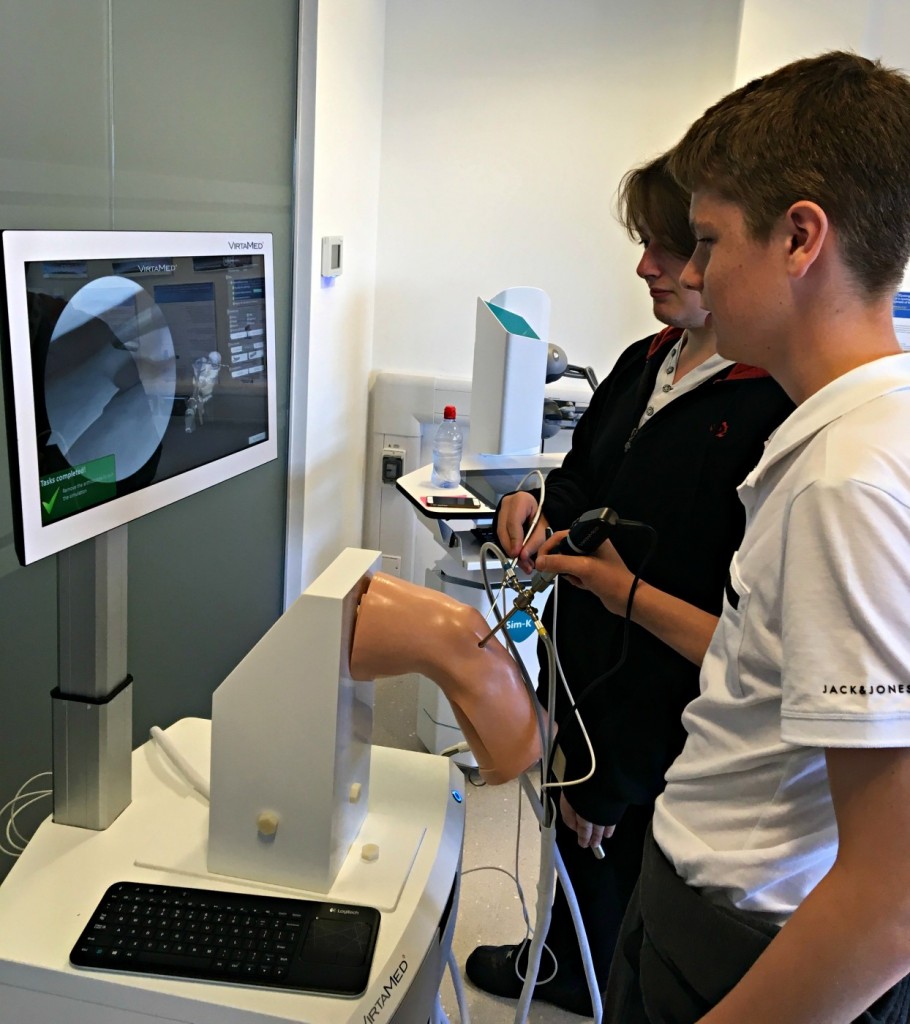 ary tests to be carried out for different aspects associated with balance, these include: anticipatory tests (when preparing for something to happen), reactive postural control (how you react to a change in motion), sensory orientation, and dynamic gait speeds (walking speeds and how they change in different circumstances). This was necessary in order to see how the effects of inspiratory muscle training effects balance over the course of 8 weeks.
ary tests to be carried out for different aspects associated with balance, these include: anticipatory tests (when preparing for something to happen), reactive postural control (how you react to a change in motion), sensory orientation, and dynamic gait speeds (walking speeds and how they change in different circumstances). This was necessary in order to see how the effects of inspiratory muscle training effects balance over the course of 8 weeks.
In terms of analysis and methods, one of the most interesting tests for us involved the breathing system and using a spirometer. This device was used to measure the Forced Vital Capacity (total air volume of the lungs), Forced Expiratory Volume (how much air a person can exhale in a forced breath), MIP (maximum pressure generated by inhalation against occluded airway), and the MEP (this is the same but is the pressure generated by exhaling). For us, this was particularly interesting because it allowed us to see how a spirometer works in a hands on experience and how the data is presented and analysed.
Another series of tests involved the PrimusRS, a very impressive machine. It served to be a challenge and required lots of problem solving to carry out the tests successfully. During our use of the PrimusRS we experienced the different processes that were needed to be carried out involving; calibration, setting up, creating templates, correcting motion to improve the results, and the analysis of the final results. This was an extraordinary piece of equipment as it allowed us to carry out endurance and isometric tests (strength tests) for both flexion, extension and rotation regarding the trunk muscles, and gave us different data including power of the muscles/ movement.
Finally, the most exciting and enjoyable session to carry out involved using Virtual Reality Simulators for knee arthroscopy (operations) that surgeons all over the world travel to see. The reason for this being the most enjoyable test/session was due to complexity behind machines that looked so simple, and it allowed us to carry out practise operations teaching you the motions and procedures that would be used in real life. Other fascinating features of the virtual simulator was the way in which it introduced us to the different textures of the bone structures and tissues by giving feedback involving vibrations and stiffness of the simulator drill/ saw as well as the screen display.
As well as all of these above tests, we also are aware of the protocols and ethics of the tests that we have carried out in the duration of the project, this allowed us to experience and build up our own picture of the research that needs to be carried out before conducting the actual investigation.
 Congratulations to Dr. Pramod Regmi as the lead author of the paper ‘Informed consent in health research: challenges and barriers in low-and middle-income countries with specific reference to Nepal‘ [1]. Informed consent is a process whereby potential participants are genuinely informed about their role, risk and rights before they are enrolled in the study. Thus, ethics committees in most countries require ‘informed consent form’ as part of an ethics application which is reviewed before granting research ethics approval. Despite a significant increase in health research activity in low-and middle-income countries (LMICs) in recent years, only limited work has been done to address ethical concerns.
Congratulations to Dr. Pramod Regmi as the lead author of the paper ‘Informed consent in health research: challenges and barriers in low-and middle-income countries with specific reference to Nepal‘ [1]. Informed consent is a process whereby potential participants are genuinely informed about their role, risk and rights before they are enrolled in the study. Thus, ethics committees in most countries require ‘informed consent form’ as part of an ethics application which is reviewed before granting research ethics approval. Despite a significant increase in health research activity in low-and middle-income countries (LMICs) in recent years, only limited work has been done to address ethical concerns.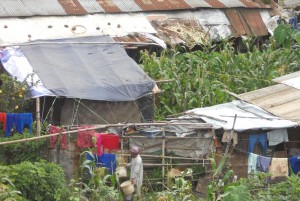
Most ethics committees in LMICs lack the authority and/or the capacity to monitor research in the field. This is important since not all research, particularly in LMICs region, complies with ethical principles, sometimes this is inadvertently or due to a lack of awareness of their importance in assuring proper research governance. With several examples from Nepal, this paper reflects on the steps required to obtain informed consents and highlights some of the major challenges and barriers to seeking informed consent from research participants. The authors offer some recommendations around how can we can promote and implement optimal informed consent taking process.
The paper will appear later this year in the international journal Developing World Bioethics (publisher: Wiley). Finally, just out of interest five out of six of the authors are graduates of the University of Aberdeen!
Prof. Edwin van Teijlingen
CMMPH
Reference:
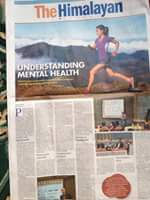
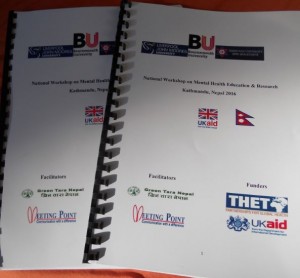 At the National Workshop on Mental Health Education & Research in Kathmandu organised by Tribhuvan University, Bournemouth University and Liverpool John Moores University last week we had quite a few television camera crews and journalists present. Sabitri Dhakal, one of the journalists from The Himalayan Times an English-language daily newspaper in Nepal, wrote a nice feature length article. This piece was based on interviews with BU Visiting Faculty Padam Simkhada and Prof. Edwin van Teijlingen conducted at our workshop. Her article with the title ‘Understanding Mental Health’ is available online.
At the National Workshop on Mental Health Education & Research in Kathmandu organised by Tribhuvan University, Bournemouth University and Liverpool John Moores University last week we had quite a few television camera crews and journalists present. Sabitri Dhakal, one of the journalists from The Himalayan Times an English-language daily newspaper in Nepal, wrote a nice feature length article. This piece was based on interviews with BU Visiting Faculty Padam Simkhada and Prof. Edwin van Teijlingen conducted at our workshop. Her article with the title ‘Understanding Mental Health’ is available online.
Mental health in pregnant women and new mothers is increasing recognised on the global health agenda. In Nepal mental health is generally a difficult to topic to discuss. THET, a London-based organisation, funded Bournemouth University, and Liverpool John Moores University in the UK and Tribhuvan University in Nepal to train community-based maternity 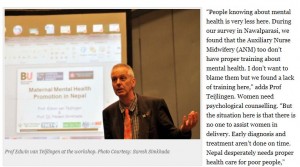 workers on issues around mental health. Thus far three groups of UK health and education experts have gone out to Nepal to train these communit maternity care providers, called Auxiliary Nurse Midwives (ANMs). ANMs, who are the key maternity service providers in rural birthing centres of Nepal, have received only 18 months of training and the training curriculum does not refer to dealing with mental health issues. The next group of volunteers is due to travel in September.
workers on issues around mental health. Thus far three groups of UK health and education experts have gone out to Nepal to train these communit maternity care providers, called Auxiliary Nurse Midwives (ANMs). ANMs, who are the key maternity service providers in rural birthing centres of Nepal, have received only 18 months of training and the training curriculum does not refer to dealing with mental health issues. The next group of volunteers is due to travel in September.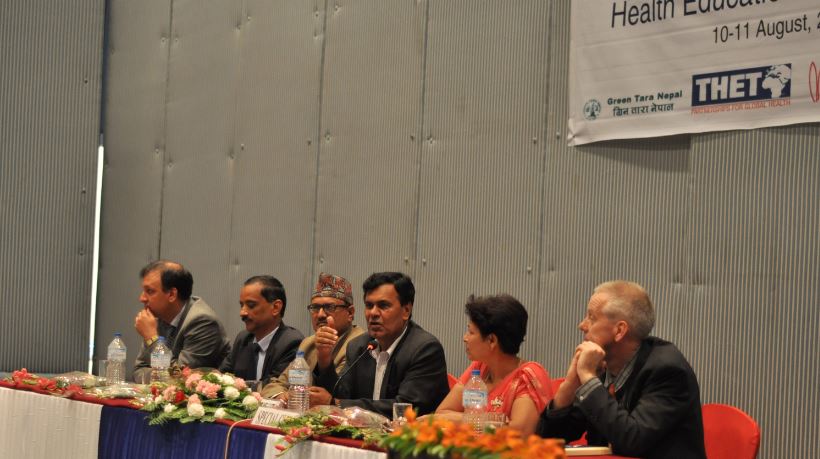
Prof. Edwin van Teijlingen
CMMPH
After nearly a year, the Fusion project on Social interaction in the event experience led by Dr Lenia Marques (Department of Event and Leisure, Faculty of Management) came to an end. The main aim of the project was to develop tools to better analyse the experience of events for audiences, focusing in particular on the social interaction part of the event experience.
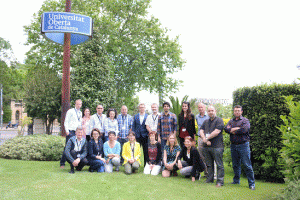
Participants in the ATLAS SIG Events, UOC, Spain
Overall, the project was successful, contributing to advances in research and also to reinforcing and expanding an international network in the field of events, and also feeding into leisure and tourism.
Several meetings took place between the partners of the project (U.K.,Spain, Portugal, the Netherlands, Romania) and also involved other partners along the way (Brazil and South Africa).The first results were presented in two conferences and the outputs will be published shortly.
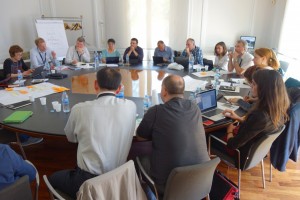
Discussing preliminary results
The project shed new light on the different dimensions of the event experience, and in particular how audiences interact with each other in and beyond the event. This is only considered as a beginning, since the partners are continuing to using the tools and work together towards using the results and developing professional practice advice.
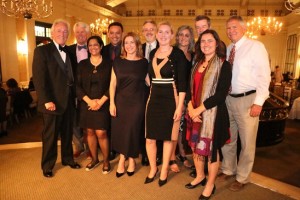
Board of Directors of the World Leisure Organization at the World Leisure Congress, South Africa
As principal investigator, I’m very satisfied with the outcomes and look forward to building on the work of the past year. This is also the time to publicly acknowledge all the partners who supported and gave valuable input to the project, as well as all the students, who in one way or the other, contributed to this project. To all those who assisted, a big thank you.
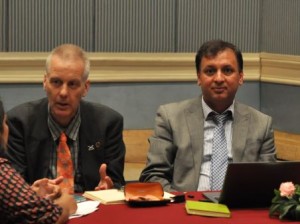 At a television interview this morning in Kathmandu I was asked how many papers I had published on health and health-related issues in Nepal. I told the interviewer from BTV Business that it was around 90 to a hundred. Coming back to Green Tara Nepal office I decide to update the list of papers on Nepal to make sure I had not lied too much on TV.
At a television interview this morning in Kathmandu I was asked how many papers I had published on health and health-related issues in Nepal. I told the interviewer from BTV Business that it was around 90 to a hundred. Coming back to Green Tara Nepal office I decide to update the list of papers on Nepal to make sure I had not lied too much on TV.
Adding up the papers, editorials and, to a lesser extent, book chapters I was pleasantly surprised that there were 25 on maternity care & midwifery, 18 on sexual & reproductive health, nine on infectious diseases, five on non-communicable diseases, six on nutrition & child health, three on mental health, two on migration and a further mixture of 38 on topics such as health systems, research methods, or health & education capacity building. If I have not double counted any of the papers that a grand total of 106. Most are co-authored with BU Visiting Faculty Prof.Padam Simkhada (from Liverpool John Moores University), many with PhD students conducting projects in Nepal and, more recently with BU post-doctoral fellow Dr. Pramod Regmi.
Prof. Edwin van Teijlingen
CMMPH
Reference (by topic)
Maternal & Neonatal Health & Midwifery
Sexual & Reproductive Health
Infectious diseases
Non-Communicable Diseases
Nutrition & Child Development
Mental Health
Migration / Occupational Health
Other (including: health systems, research methods, capacity building)
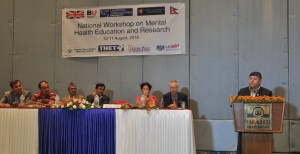 Today we completed the second day of training of health teachers, lecturers in nursng, public health and the like in Kathmandu. We called it the National Workshop on Mental Health Education & Research and this two-day workshop was held in a hotel in Kathmandu. It was organised by Tribhuvan University in collaboration with Bournemouth University and Liverpool John Moores University (LJMU). Mental health is high on the global agenda and want to raise the issue more in Nepal. The three universities are working together on an education intervention training Auxiliary Nurse Midwives in Nawalparasi on mental health issues and mental health promotion. The project is funded under the Health Partnership Scheme (HPS) from DfID and managed by THET (Tropical Health & Education Trust).
Today we completed the second day of training of health teachers, lecturers in nursng, public health and the like in Kathmandu. We called it the National Workshop on Mental Health Education & Research and this two-day workshop was held in a hotel in Kathmandu. It was organised by Tribhuvan University in collaboration with Bournemouth University and Liverpool John Moores University (LJMU). Mental health is high on the global agenda and want to raise the issue more in Nepal. The three universities are working together on an education intervention training Auxiliary Nurse Midwives in Nawalparasi on mental health issues and mental health promotion. The project is funded under the Health Partnership Scheme (HPS) from DfID and managed by THET (Tropical Health & Education Trust).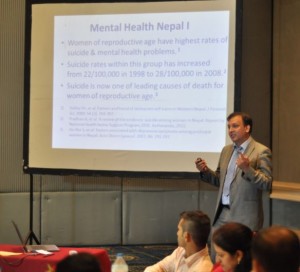
Key speakers on the first day of the workshop included: the VC of Tribhuvan University, Dr Gangalal Tuladhar MP and former Education Minister of Nepal, Dr Khem Karki (head of the Nepal Health Research Council), Dr Chandra Kala Sharma, Prof Shyam Krishna Maharjan and Prof Krishna Acharya.
This workshop is part of this capacity building process and the audience of largely university and college lecturers will take some of the learning back with them to improve the education of health workers in Nepal.
The second day of the workshop concentrateed on research methods for community-based projects such as this our THET funded one in the mental health field. Prof. Edwin van Teijlingen reminded the audience that it is important that novel mental health interventions like ours are properly evaluated, and that the people doing the evaluations have the appropriate rese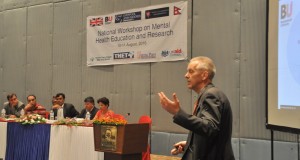 arch skills. The next group of UK volunteers are due to travel to Nepal in September.
arch skills. The next group of UK volunteers are due to travel to Nepal in September.
Prof. Edwin van Teijlingen
CMMPH
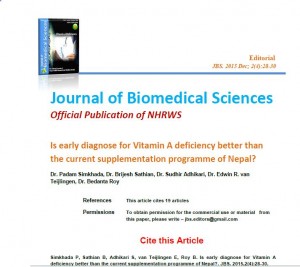 This week we published an editorial in the Journal of Biomedical Sciences on the question: “Is early diagnose for Vitamin A deficiency better than the current supplementation programme of Nepal?”
This week we published an editorial in the Journal of Biomedical Sciences on the question: “Is early diagnose for Vitamin A deficiency better than the current supplementation programme of Nepal?”
The editorial concludes that prevention is still better than cure, but instead of a mass Vitamin A supplementation in Nepal, we need a health promotion intervention aiming to increase the intake of relatively cheap vegetables and fruit (containing β carotene). In addition we need better surveillance and help to identify children with Vitamin A Deficiency and provide them with Vitamin A supplements. The primary focus should be on adopting sustainable food based approaches to combat vitamin A deficiency. In Public Health terms: rather than a blanket coverage of Vitamin A supplementation to whole population we should consider a targeted intervention aimed at those who need it most.
Reference:
Simkhada P, Sathian B, Adhikari S, van Teijlingen E, Roy B. (2015) Is early diagnose for Vitamin A deficiency better than the current supplementation programme of Nepal?. J Biomed Sci. 2(4):28-30.
http://www.nepjol.info/index.php/JBS/index
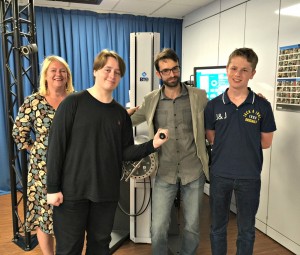
The Faculty of Health & Social Sciences (FHSS) has been hosting four Nuffield Foundation-funded college students this summer as part of Nuffield’s Research Placement programme. Two of the students (Jamie Singleton and Freddie Corrie-Deane) are working under the guidance of FHSS PhD student Francesco Ferraro, who is supervised by Professors Alison McConnell, Tom Wainwright and Dr James Gavin.
Jamie and Freddie joined us on the 25th of July and they are already familiar with many research aspects, such as: writing a review, dealing with ethical issues, using complex devices and tackling statistical issues.
Francesco has found the experience of working with the students rewarding from many perspectives: “I do trust their questioning and their will to learn and understand more, as it will help the project adding new questions. Conducting research is not simply a duty to search for results; producing research involves the ability to share it, by allowing others to join, bringing their own curiosity and surprise”.
A quote from Richard Feynman sums up the project so far “I would rather have questions that can’t be answered than answers that can’t be questioned.”
Here are a few thoughts from those involved in Freddie and Jamie’s Nuffield placements:
“Joining a research study, I knew I was in for a hefty chunk of reading, and with a pessimistic outlook I thought it would all be dry and bland, and that it would be the source of countless days of boredom. Thankfully I was wrong, and while I did have to spend an obligatory day or two reading background information, studies and manuals; the rest of this placement has been involved with the workings of brand-new machinery in the Orthopaedic Research Institute and going out into the local community to talk with people, both of which have been challenging and engaging in all of the right ways to make this experience an enjoyable one.
Our engagement in the community started very early into the placement, on the second day in fact, when we tagged along with Francesco (Our PhD Student overseer/mentor) to an area of sheltered housing to help him give a talk on his study, it was some really good hands on experience (it didn’t hurt that we were offered a biscuit or two). Following this line of talking to people, Jamie and I have spent the last couple of days walking around the gardens by the seaside talking to people and filling out surveys.
We have also spent a day or two engrossed in the outstanding labs in the Orthopaedic Research Institute, equipped with an amazing range of equipment from a pair of surgery VR simulators that bring in experts and surgeons from all over Europe, to the intricate and ever useful Primus Machine which has more potential and customisable positions than there are hours in the day and so understandably has just as many uses.”
“During the past two weeks at Bournemouth University, we have had lots of hands on experience and witnessed the fun sides of research and also, the not-quite side. The latter, quite funnily enough, involved vast amounts of background reading and studying of protocols. The more enjoyable hands on experience however, consisted of being introduced to and working in the Orthopaedic Research Institute Labs testing out protocols. Much to our disappointment… we had to use numerous fun and expensive pieces of equipment, it was at this point we knew this was the right place to be.
Amongst playing around with expensive machinery such as the PrimusRS and the Virtual Reality machines, we got to do some real work. This work was tough yet enriching and consisted of explaining what the research was about and why it is essential to a sheltered community, and of course when asked, accepting the offer for tea and biscuits. Visiting the shelter did give me an insight into the recruitment process for research projects, and I was quite surprised of how laid back it was.
Next, this time for real we did have work to do such as reading protocols, resources, and informative documents needed to produce our review which was not the most exciting experience however, it was made up for by the interesting walks we went on, through the Lower Gardens, in order to gather vital information that we needed for our project analysis of the PASE questionnaire.”
“I was really excited to visit our Nuffield students who are working with Francesco Ferraro at Bournemouth University. I was particularly keen to see how they have been integrated into the team working on a real life application. I was surprised by the highly technical, world class, equipment available to the team. I was also surprised to see how health care is being ‘gamefied’ with the balance app and the ‘Grail’. Thank you for having us.”
“Freddie and Jamie have been a huge asset to Francesco’s work over the past couple of weeks. They have worked together as a team to solve problems and test solutions, and I can see how all three of them have benefitted from the experience. I’d recommend hosting Nuffield placement students to anyone; they’ve been a pleasure to have around and they’ve both made valuable contributions to our work.”

Innovate UK has launched a fund to encourage small British firms to work with international businesses and to help them enter global markets.
UK businesses looking to create international business networks can apply for funding to enable commercial research and innovation partnerships. It will also help businesses explore ideas for future collaboration.
Innovate UK is funding this competition. It is open to small and medium enterprises (SMEs). The funding will enable SMEs to carry out short feasibility studies and spend time abroad. The competition will encourage UK firms to create long term partnerships with overseas companies. It will also help them gain a better understanding of collaborative opportunities.
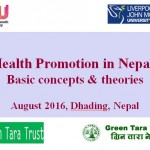 Today and yesterday Green Tara Nepal (GTN) staff spent discussing and planning their health promotion intervention in the district of Dhading. The sessions included feedback by the GTN on progress to-date as well as a discussion of their perceptions of the various relevant health needs in the community. BU has been working with GTN for over seven years. [1] Yesterday BU professor Edwin van Teijlingen gave an interactive workshop on communication skills. This morning BU’s Visiting Professor Padam Simkhada from Liverpool John Moores University (LJMU) outlined key health promotion concepts and theories to the fieldworkers.
Today and yesterday Green Tara Nepal (GTN) staff spent discussing and planning their health promotion intervention in the district of Dhading. The sessions included feedback by the GTN on progress to-date as well as a discussion of their perceptions of the various relevant health needs in the community. BU has been working with GTN for over seven years. [1] Yesterday BU professor Edwin van Teijlingen gave an interactive workshop on communication skills. This morning BU’s Visiting Professor Padam Simkhada from Liverpool John Moores University (LJMU) outlined key health promotion concepts and theories to the fieldworkers.
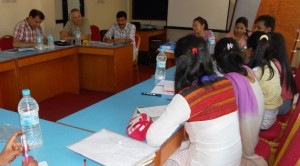 This particular post-disaster health promotion project grew out of years of research-based interventions run by GTN and the needs seen in areas affected by last years’ serious earthquakes in Nepal. The project has received support from various funding agencies, including Green Tara Trust, a London-based Buddhist charity. The training is being held in Dhadingbesi, about four hours drive away from the capital Kathmandu. The various photos with this blog show the results of a social mapping exercise. These included some beautifully hand-drawn maps of the individual wards in the area, indicating where the health post is situated, but more importantly the house of currently pregnant women.
This particular post-disaster health promotion project grew out of years of research-based interventions run by GTN and the needs seen in areas affected by last years’ serious earthquakes in Nepal. The project has received support from various funding agencies, including Green Tara Trust, a London-based Buddhist charity. The training is being held in Dhadingbesi, about four hours drive away from the capital Kathmandu. The various photos with this blog show the results of a social mapping exercise. These included some beautifully hand-drawn maps of the individual wards in the area, indicating where the health post is situated, but more importantly the house of currently pregnant women.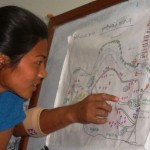
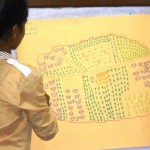 Several GTN project have been, or ar currently, evaluated by FHSS Ph.D. students. The GTN project in Pharping has been evaluated by Sheetal Sharma, who has published several papers from this research.[2-4] The GTN project in Nawalparasi is currently being studied by Preeti Mahato, who has also already published from her thesis research despite being less than halfway through. [5] Prof. Padam Simkhada is external supervisor for both these BU Ph.D students.
Several GTN project have been, or ar currently, evaluated by FHSS Ph.D. students. The GTN project in Pharping has been evaluated by Sheetal Sharma, who has published several papers from this research.[2-4] The GTN project in Nawalparasi is currently being studied by Preeti Mahato, who has also already published from her thesis research despite being less than halfway through. [5] Prof. Padam Simkhada is external supervisor for both these BU Ph.D students.
Prof. Edwin van Teijlingen
CMMPH
References:
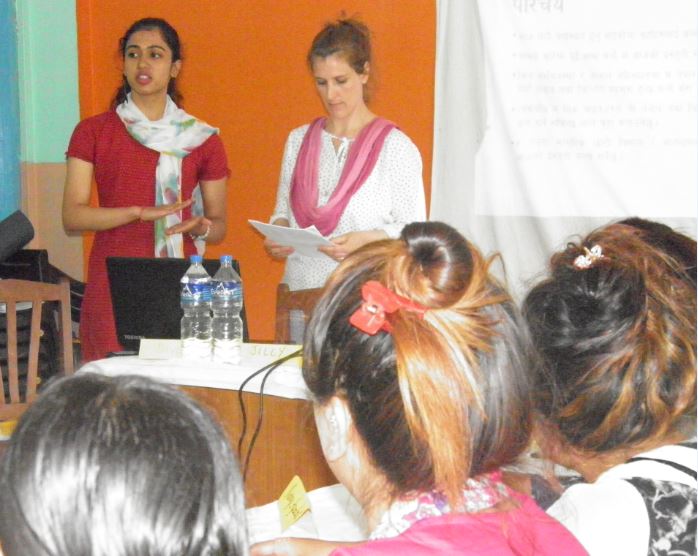 This week we had our latest planning meeting for the BU-led and THET-funded project in Nepal. The project has been running for over a year (following a six-month delay due to the terrible 2015 earthquake in Nepal). The project brings highly experienced UK health volunteers to train local community-based maternity care practitioners about the key mental health issues in pregnancy and after birth. The Centre for Midwifery & Maternal Health (CMMPH) works in collaboration with Liverpool John Moores University (LJMU), the Department of Health, Physical and Population Education at Nepal’s largest university Tribhuvan University’s (TU). Our project is part of the Health Partnership Scheme (HPS), which funds health partnerships to carry out capacity-building projects in low-income countries, including Nepal. HPS itself is funded by the UK Department for International Development and managed by THET.
This week we had our latest planning meeting for the BU-led and THET-funded project in Nepal. The project has been running for over a year (following a six-month delay due to the terrible 2015 earthquake in Nepal). The project brings highly experienced UK health volunteers to train local community-based maternity care practitioners about the key mental health issues in pregnancy and after birth. The Centre for Midwifery & Maternal Health (CMMPH) works in collaboration with Liverpool John Moores University (LJMU), the Department of Health, Physical and Population Education at Nepal’s largest university Tribhuvan University’s (TU). Our project is part of the Health Partnership Scheme (HPS), which funds health partnerships to carry out capacity-building projects in low-income countries, including Nepal. HPS itself is funded by the UK Department for International Development and managed by THET.
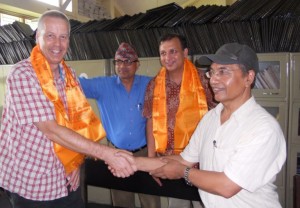 Halfway through the project we had an update meeting at Tribhuvan University in Kathmandu to discuss and plan the second half of the project which runs until the spring in 2017. The maternal mental health project is a good example of BU’s FUSION approach as it combines Education (through the training of Auxiliary Nurse-Midwives) by UK volunteers (representing the Practice-element of FUSION) in an intervention that is Research-based in both its design and evaluation. The next group of UK volunteers is due to go out to southern Nepal in September 2016. The photo on the top shows one of the UK volunteers (a midwife from Aberdeen) in action with the aid of a Nepali translator during the latest training session in Nawalparasi in May 2016.
Halfway through the project we had an update meeting at Tribhuvan University in Kathmandu to discuss and plan the second half of the project which runs until the spring in 2017. The maternal mental health project is a good example of BU’s FUSION approach as it combines Education (through the training of Auxiliary Nurse-Midwives) by UK volunteers (representing the Practice-element of FUSION) in an intervention that is Research-based in both its design and evaluation. The next group of UK volunteers is due to go out to southern Nepal in September 2016. The photo on the top shows one of the UK volunteers (a midwife from Aberdeen) in action with the aid of a Nepali translator during the latest training session in Nawalparasi in May 2016.
Prof. Edwin van Teijlingen (CMMPH) and Prof. Padam Simkhada (LJMU & BU Visiting Faculty)
We have previously posted about the Research and Knowledge Exchange (RKE) Development Framework. Here, we introduce another of the pathways: that focusing on funding research via non-UK, international funders. This includes EU research.
 For international activity, there will be a range of sessions, drawing on the current priorties in BU’s Global Engagement strategy There will be spearate sessions for major international funders, including US National Institutes of Health and other US-based funding agencies. There will also be exploration of applications to funders with an international mandate, such as Newton Fund calls. Importantly, with so many international funders available, we will be hosting sessions dedicated to finding the right international funders for researchers to consider. We’ll also be running a session giving information and examples relating to building partnerships and working with stakeholders. More events will be added to this pathway in 2017-18, and beyond, with a focus on emerging priorties for BU.
For international activity, there will be a range of sessions, drawing on the current priorties in BU’s Global Engagement strategy There will be spearate sessions for major international funders, including US National Institutes of Health and other US-based funding agencies. There will also be exploration of applications to funders with an international mandate, such as Newton Fund calls. Importantly, with so many international funders available, we will be hosting sessions dedicated to finding the right international funders for researchers to consider. We’ll also be running a session giving information and examples relating to building partnerships and working with stakeholders. More events will be added to this pathway in 2017-18, and beyond, with a focus on emerging priorties for BU.
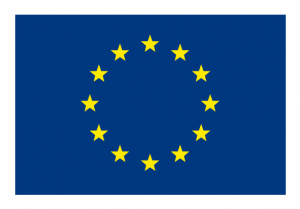 For the European dimension, we are planning a wide range of sessions relating to European funding opportunities, by a mix of online resources and face-to-face sesions introducing the EU funding landscape and key calls. Sessions will draw on the knowledge of BU staff and external facilitators. At these events, you will be introduced to the details of specific call types within the three pillars of Horizon 2020, including, where possible, the experience of fellow-academics, who have been directly involved in receiving EU funding. We will also be inviting external experts to expand the range of calls to which BU academics apply. Important to EU bids, we’ll run a session giving information and examples relating to building robust partnerships and working with stakeholders. In common with other pathways, there will be practical sessions to help you the systems invovled. For the EU, this will include use of the Participant Portal, to plan and support your bidding activity. Often overlooked, we will also be running events to raise awareness of EU funding outside the flagship Horizon 2020 scheme, such as COST, Interreg and Creative Europe. Early in the 16/17 academic year, we will host our, always popular, annual UKRO information day for BU academics and research support staff.
For the European dimension, we are planning a wide range of sessions relating to European funding opportunities, by a mix of online resources and face-to-face sesions introducing the EU funding landscape and key calls. Sessions will draw on the knowledge of BU staff and external facilitators. At these events, you will be introduced to the details of specific call types within the three pillars of Horizon 2020, including, where possible, the experience of fellow-academics, who have been directly involved in receiving EU funding. We will also be inviting external experts to expand the range of calls to which BU academics apply. Important to EU bids, we’ll run a session giving information and examples relating to building robust partnerships and working with stakeholders. In common with other pathways, there will be practical sessions to help you the systems invovled. For the EU, this will include use of the Participant Portal, to plan and support your bidding activity. Often overlooked, we will also be running events to raise awareness of EU funding outside the flagship Horizon 2020 scheme, such as COST, Interreg and Creative Europe. Early in the 16/17 academic year, we will host our, always popular, annual UKRO information day for BU academics and research support staff.
We’ll be populating the the OD website with more information and the booking link over the coming weeks. We’ll also be providing a timetable of all events as soon as possible. In the meantime, updates will be posted on the BU Research Blog and the Faculty blogs.

The Creative Industries Council’s new 5 year strategy proclaims amazing news for the Creative Industries. With the sector growing at 8.9% a year (making it the second fastest growing sector), the UK’s Creative Industries is vital to the UK’s economy.
The 2016 strategy refresh is demanding but attainable, with a focus on driving economic value, through support for business growth, job growth, exports and inward investment. The sector seeks to build on existing trade relationships and to unlock the potential of the sector in international markets with a primary focus on the USA and key territories in Europe, Asia and the Middle East. Review the Nesta/Creative England report on the Geography of Creativity . This includes rich content about regional opportunities.
![]()
 This time in Nepal I noticed for the first time that ordinary people know about Bournemouth. Over the past seven years, since I started at Bournemouth University, I have struggled to explain to taxi drivers, people sitting next to me on public transport, etc. where Bournemouth is situated. This time for the first time I am getting nods and positive signs of recognition. This has little to do with Bournemouth University’s various health and media research collaborations in the country, but it is all to do with The Cherries!
This time in Nepal I noticed for the first time that ordinary people know about Bournemouth. Over the past seven years, since I started at Bournemouth University, I have struggled to explain to taxi drivers, people sitting next to me on public transport, etc. where Bournemouth is situated. This time for the first time I am getting nods and positive signs of recognition. This has little to do with Bournemouth University’s various health and media research collaborations in the country, but it is all to do with The Cherries!
It started last year with Bournemouth’s first successfull year in the Premier League. AFC Bournemouth winning games against some of the top English team during last season has made AFC Bournemouth well-known among many Nepali football fans. So thank you to AFC Bournemouth for no longer having to explain that I work in Bournemouth at Bournemouth University. And that Bournemouth is about two hours away by train from London, southwest of London on the coast to be precise.
Prof. Edwin van Teijlingen
Centre for Midwifery, Maternal and Perinal Health
Bournemouth University
If you have a number of research projects running in the same location it pays to combine some of the preparation. Thus as part of five different studies and one PhD project, I’m currently in Kathmandu. The projects are (1) the THET-funded intervention in Nawalparasi; (2) the CEL-funded qualitative research led by Dr. Catherine Angell on CPD (Continuous Professional Development); (3) the FHSS-funded project on transgender which is led by Dr. Pramod Regmi; (4) the FHSS-funded project with Pourakhi which supports Nepali women returning home after having been abroad as migrant workers; and (5) the Green Tara Trust funded project on improving maternal health care in Dhading and Nawalparasi, and the FHSS PhD project is that of Mrs. Preeti Mahato. Two of the project and the PhD topcic are closely related as all three cover maternity care in one for or another in Nawalparasi. The planning meetings we are having in Nepal involve planning training sessions and workshops, resource allocation and research preparation.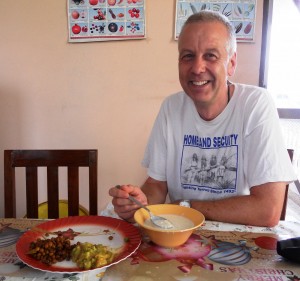
Fortunately, it is not all work. Today I enjoyed Kheer (Achar and Chana) for lunch in the Green Tara flat in Kathmandu a lovely rice pudding with slightly sour green vegetables and chick peas (see photo). The actual meal is traditionally health tomorrow but as this is the weekend the staff brought it one day forward so that I could join in too.
Finally, I like to thank colleagues who gave me mobile phones and a camera. One of the mobile phones is already in use by one of the Nepali charity workers in Kathmandu. I bought a new battery and memory card for camera in the UK and it is working fine, the photo with this blog has been taken with the donated camera!
Prof. Edwin van Teijlingen (writing from Nepal).
Centre for Midwifery, Maternal & Perinatal Health Research
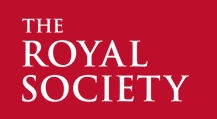
The Royal Society, under the Global Challenges Research Fund (GCRF), invites applications for its international collaboration awards for research professors. These enable outstanding UK research leaders to develop international collaborations with the best research professors from around the world, to work on some of the global challenges and problems facing developing countries.
The objectives of the challenge awards are to:
•support the best UK scientists in establishing sustainable collaborations with internationally leading scientists based overseas;
•promote collaboration and sharing of knowledge through reciprocal visits between the visiting research professors and their research groups;
•support outstanding research through collaboration with the aim of addressing global challenges facing developing countries and benefiting people in these countries;
•facilitate the development of multidisciplinary collaborations and approaches that could help address the complex research questions posed by global challenges;
•attract outstanding international scientists and their teams to the UK’s best universities and research institutions;
•strengthen UK science and open up new opportunities to exploit and translate research for economic benefit.
Global challenge themes include: sustainable health and well-being; sustainable resources; sustainable growth; sustainable local research and innovation capacity.
Click here for further information including eligibility and the application process.
If you are interested in submitting to this call you must contact your RKEO Funding Development Officer with adequate notice before the deadline.
For more funding opportunities that are most relevant to you, you can set up your own personalised alerts on Research Professional. If you need help setting these up, just ask your School’s/Faculty’s Funding Development Officer in RKEO or view the recent blog post here.
If thinking of applying, why not add notification of your interest on Research Professional’s record of the bid so that BU colleagues can see your intention to bid and contact you to collaborate.